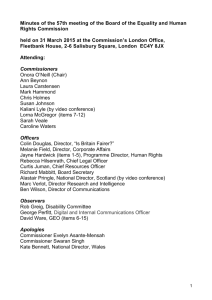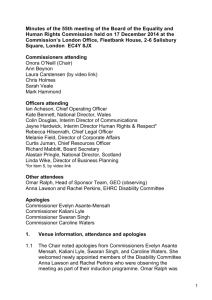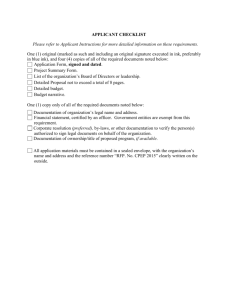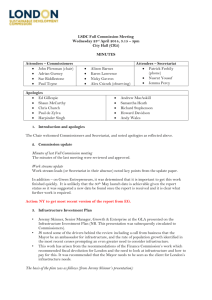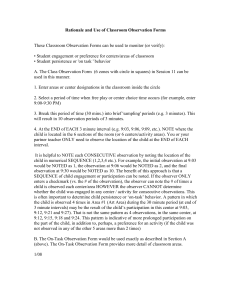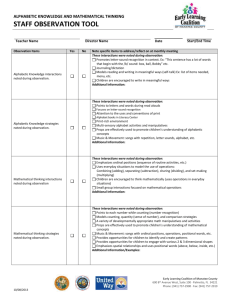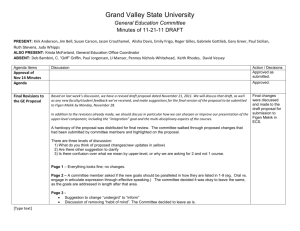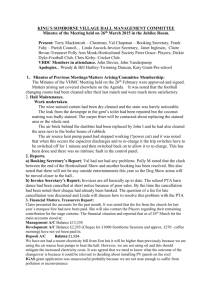Item 3: Minutes of Board Meeting – 26 March 2014 (EHRC 52.01)
advertisement
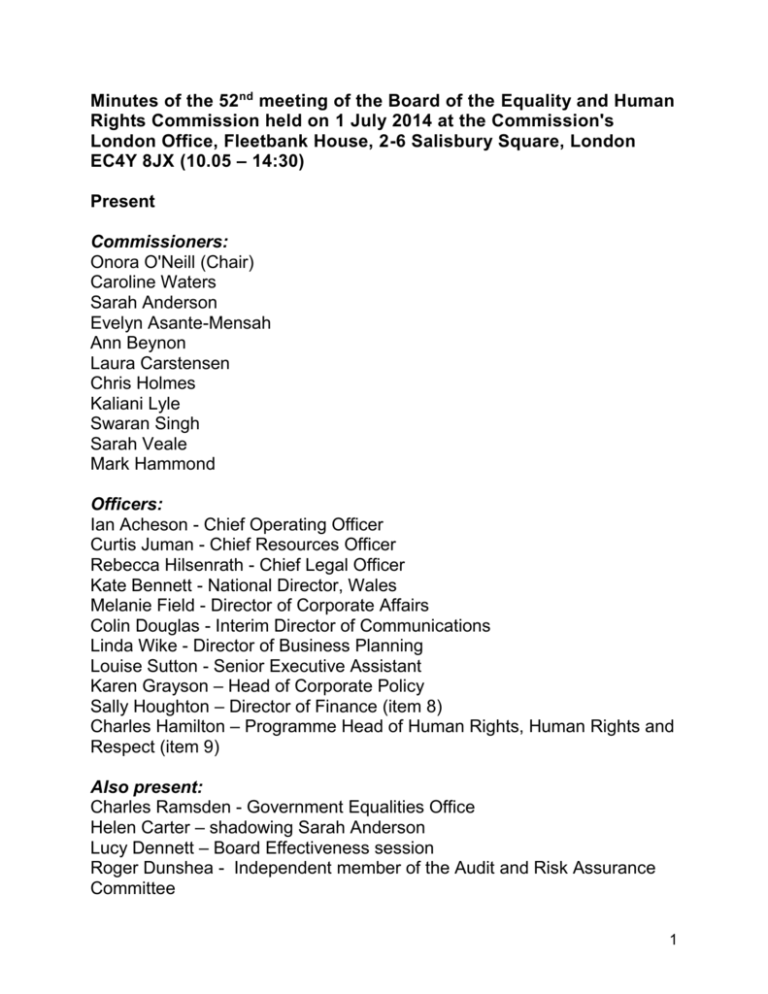
Minutes of the 52nd meeting of the Board of the Equality and Human Rights Commission held on 1 July 2014 at the Commission's London Office, Fleetbank House, 2-6 Salisbury Square, London EC4Y 8JX (10.05 – 14:30) Present Commissioners: Onora O'Neill (Chair) Caroline Waters Sarah Anderson Evelyn Asante-Mensah Ann Beynon Laura Carstensen Chris Holmes Kaliani Lyle Swaran Singh Sarah Veale Mark Hammond Officers: Ian Acheson - Chief Operating Officer Curtis Juman - Chief Resources Officer Rebecca Hilsenrath - Chief Legal Officer Kate Bennett - National Director, Wales Melanie Field - Director of Corporate Affairs Colin Douglas - Interim Director of Communications Linda Wike - Director of Business Planning Louise Sutton - Senior Executive Assistant Karen Grayson – Head of Corporate Policy Sally Houghton – Director of Finance (item 8) Charles Hamilton – Programme Head of Human Rights, Human Rights and Respect (item 9) Also present: Charles Ramsden - Government Equalities Office Helen Carter – shadowing Sarah Anderson Lucy Dennett – Board Effectiveness session Roger Dunshea - Independent member of the Audit and Risk Assurance Committee 1 Dean Parker - Independent member of the Audit and Risk Assurance Committee Apologies: Alastair Pringle - National Director, Scotland SECTION 1: FORMAL ITEMS Item 1: Welcome 52/1.1 The Board noted that Commissioner Chris Holmes would be joining the meeting later due to parliamentary duties. 52/1.2 The Chair introduced Lucy Dennett, who would be facilitating the discussion on Board Effectiveness and was attending to observe the meeting; and noted that the independent members of the Audit and Risk Assurance Committee (ARAC) would also be observing. Helen Carter was present, shadowing Commissioner Sarah Anderson. Item 2: Declaration of Interest 52/2.1 The following declarations of interest were noted: Standing declaration: Commissioner Caroline Waters is a Board member of National Equality Standard. New Declaration: the Chair had been asked to be part of an Independent Panel looking at UK Surveillance Programmes, convened by Kings College London. Item 3: Minutes of Board Meeting – 26 March 2014 (EHRC 52.01) 52/3.1 The minutes of the meeting held on 26 March 2014 were approved as a correct record. 52/3.2 Commissioner Evelyn Asante-Mensah noted that she had been late to the 26 March meeting as she had been attending a meeting with the Office of the Commissioner for Public Appointments (OCPA). This had been a positive meeting and the EHRC was scoping work with the 2 Commissioner on diversity in appointments. Karen Jochelson was leading on this. Item 4: Matters Arising from the Minutes (EHRC 52.02) 52/4.1 Board members asked for an update on the following items which had not been completed in the Matters Arising Report: 44/7.3 – Action F – Litigation Strategy 52/4.2 Rebecca Hilsenrath confirmed that she expected to bring a framework for consultation to the Board in September, to enable the Commission to consult with the sector over the Autumn. 51/5.2 – Action E – remove repetition 52/4.3 The Board noted that although the Performance Report had been slimmed down, there was still repetition throughout the paper. 52/4.4 Curtis Juman explained that the Board was provided with the Summary which was seen by GEO, along with the detail of the report; this meant that there was some repetition but staff were working to remove as much as possible. The Chair noted that it was important to be as succinct as possible. 51/8.3 – Action N – letter to GEO regarding the Equality Advisory and Support Service 52/4.5 Mark Hammond noted that, although GEO had not yet sent a formal response to the letter, he had raised the issue in discussion with the Director of GEO. He understood that GEO had their own concerns as contract managers and were aware of the issues – both matters relating to Wales and Scotland and others – including the lack of referrals of strategic legal cases. The Commission continued to attend the Stakeholder meetings, and Mark expected that engagement on this issue would increase as GEO considered the next steps on the contract up to its planned end date in 2015. 52/4.6 Officers noted that the following Actions in the Matters Arising Report had been completed: 51/3.3 Action B and C 51/4.2 – Action D 3 51/5.2 – Action F 51/6.2 – Action G 51/7.7 – Action M 51/12.4 – Action Q In addition, 51/12.2 – Action P would be carried forward to 2015. 52/4.7 The Matters Arising report was noted. SECTION 2: STANDING ITEMS Item 5: Communication (EHRC 52.03) 52/5.1 Colin Douglas introduced his paper. The Communications Strategy had been agreed at the meeting on 26 March, and this was an update on the first phase of implementation. 52/5.2 Generally there had been good progress in implementing the strategy. The key messages and corporate narrative were being embedded and used consistently across key products, including the Business Plan, Annual Report and Accounts, press statements and other documents. 52/5.3 Unfortunately the mapping of key stakeholders activity had slipped slightly. Colin expected to take a paper to Senior Management in July, and then hoped to catch up with this exercise. 52/5.4 The launch of the new website had been a success, bringing a more technically accessible product. The Legal Team continued to update guidance. 52/5.5 The Communications Directorate restructure had been finalised, with the formal implementation date of 7 July although there were a number of vacancies still to be filled within the team. 52/5.6 The main point for the Board to be aware of was the Advertising and Marketing Plan. Cabinet Office approval was required for spend on communications activity over £100k. The submission had been sent to the Cabinet Office, and Colin Douglas noted his thanks to Charles Ramsden and other GEO and DCMS colleagues for their support. 4 52/5.7 Substantial elements of the Business Plan depended heavily on communications to deliver, or to deliver effectively, and this had been impressed upon the Cabinet Office. The paper presented options for the Board in the event that Cabinet Office delayed their decision, or rejected the Advertising and Marketing Plan in part or in full. 52/5.8 It was noted that accepting a negative decision from Cabinet Office would have implications for delivery against the Business Plan and could call the Commission's independence into question. On the other hand, while spending on communications activities without approval could lead to issues with the National Audit Office on accounting rules and appropriateness of spend. 52/5.9 The following points were made in discussion: A high-level discussion with Cabinet Office could be beneficial, particularly considering the improvements the Commission had achieved in its internal spending controls in recent years. There was concern about the burden of completing requests such as these from the Cabinet Office. Commissioners sought clarity about which activities are classified as ‘advertising or marketing’ and how this relates to delivery of core functions, such as publicising Inquiries. As well as engaging with the Cabinet Office, it might be helpful to discuss the issue with the Foreign and Commonwealth Office. The JCHR had recently approached the Commission with a number of follow-up questions relating to the Chair’s evidence session. This included whether any additional controls to the discretionary programme-funded element of the Commission’s budget were in place – this may provide a useful conduit to engage with the JCHR on this issue. 52/5.10 In response, Colin noted that the Commission had been able to negotiate what was classified as marketing and advertising to some extent – as such, launching an Inquiry was out of scope, but a good deal of activity remained in scope. He suggested that the risk be escalated from the Operational Risk Register to the Strategic Risk Register. 5 52/5.11 As a decision from the Cabinet Office was outstanding, the Board agreed that Melanie Field and Colin should try to establish contact at the Cabinet Office (Action A) to discuss this preemptively at a strategic level, and if necessary engage the Foreign and Commonwealth Office. The response to the JCHR’s additional questions should include a summary of the Marketing and Advertising Plan controls (Action B). In addition, the risk on the Marketing and Advertising Plan would be escalated to the Strategic Risk Register under the two strategic risks on the Commission’s A Status and Delivery of the Business Plan (Action C). Item 6: Period 2 Performance Report (EHRC 52.04) 52/6.1 The Board received the Period 2 financial results and delivery performance against the 2014/15 Business Plan. The Chair welcomed Roger Dunshea and Dean Parker, the independent members of the Audit, Risk and Assurance Committee (ARAC). Curtis Juman noted that the launch of the Business Plan on time meant the Commission was better placed than at the same time the previous year. 51/6.2 Commissioners considered the paper in detail, and the following key points were made during discussion: Commissioner Sarah Anderson expressed concern about the delays to the FTSE350 and Cleaning Sector projects. Linda Wike explained that the FTSE350 work had been delayed by a month, contributing to the under spend. Deputy Chair Caroline Waters noted that the delay to the Cleaning Sector project was due to taking the opportunity to obtain additional research and evidence from cleaning firms. Curtis Juman noted that the delay to the Disability Committee recruitment had been due to agreeing the role profile, and that the profiling of the spend had been optimistic. However, dates were in the diaries for sifts and interviews and this should be caught up over the Summer. The Board queried the expected end dates of a number of Interim and Agency workers. Curtis Juman explained that the communications restructure may result in an extension to one contract, and that plans were in place for the Communications Director post. Commissioner Sarah Anderson queried who the Board-level lead on the SME Advisory Group and research would be once she departed. 6 It was important that Board received candid, authentic qualitative input from the group, therefore the membership would need managing to ensure that this happened. Ian Acheson would review the membership (Action D) and Ian and Karen Jochelson would work with Sarah Anderson and Caroline Waters to agree a Board lead for this work (Action E). The Board queried the work on disabled people's access to banking services. Curtis clarified that this was in the scoping phase following the input from the Disability Committee. On caste, Charles Ramsden updated the Board that the Government was awaiting the outcomes of the full hearing in October on an employment case, and was considering a feasibility study. Commissioner Sarah Veale was concerned that there was significant pressure from both sides of the lobby and that the Commission should have a clear position. Colin Douglas would circulate agreed lines to Commissioners to ensure that they had them to hand (Action F). The Chair noted that she had met with Lord Harris and Lord Avebury. Sarah Anderson noted that the arrow for the staff sick days lost to illness had been coded wrongly. Curtis Juman and Linda Wike would correct (Action G). Commissioner Evelyn Asante-Mensah noted that the Commission had been waiting for the outcome of the Parliamentary Inquiry into FGM, and wondered whether there was any update. Mark Hammond confirmed the report had just been published, and would be considered shortly. 52/6.3 The Performance Report for Period 2 was noted. Item 7: Update on Strategic Risks (EHRC 52.05) 52/7.1 The Board received a paper providing an update on the current status of the Commission's strategic risks and progress on mitigating actions. 52/7.2 The Board noted that the scheduling of the ARAC meeting and the Board meeting had meant changes made to the risk register at ARAC had not been reflected in the Board papers. Curtis Juman would check the scheduling of ARAC meetings to ensure this only occurred when the Annual Report and Accounts was being agreed (Action H). Ann Beynon 7 noted the need to amend the constitutional change risk and other risks discussed at the ARAC meeting, and Linda Wike would reflect these (Action I). 52/7.3 Curtis Juman then spoke to the Financial Risks. He did not expect any further reductions from HM Treasury before the General Election. The Commission was living inside its budget with controls in place, and Curtis Juman thanked Charles Ramsden for the positive relationship between the Commission and DCMS and GEO Colleagues and continuing constructive dialogue. 52/7.4 Curtis Juman’s team were modeling potential future changes, spending reviews etc. In respect of the Commission's A status, the ICC would be concerned with whether future budget reductions were proportionate in relation to cuts to the wider public sector. 52/7.5 It was important to note that the Commission was tightly budgeted on staff and resources, with little spare capacity and that unforeseen events could put projects at risk. However, staff were working hard, and further productivity gains could be made. Now there was a focus on driving up quality, including training on forecasting on project spending. SECTION 3 – PAPERS FOR DECISION / KEY PAPERS FOR INFORMATION Item 8: Annual Report and Accounts (EHRC 52.06) 52/8.1 The Board received a copy of the Annual Report and Accounts which had been considered by the Audit Risk and Assurance Committee on 26 June. One point had been raised by the Secretary of State, to which the Commission had responded, and agreement for the Annual Report and Accounts to be laid before Parliament was now awaited. 52/8.2 As Chair of ARAC, Sarah Anderson thanked Sally Houghton and her team for getting the Commission to such a good place. She also thanked the independent members of ARAC for their input on the Annual Report and Accounts. She noted she had met with the new Internal Auditors. 8 52/8.3 The Board agreed the Annual Report and Accounts. 52/8.4 In relation to the Information pack which was circulated in May, a number of questions were asked about the Period 12 Performance Report. The covering sheet needed to be clearer about sickness absence – Curtis agreed to amend (Action J) The £560k underspend would be returned to HM Treasury, but it was important that the Commission continued to improve its forecasting on the budget. Curtis noted that there would be a re-forecast in September to ensure that budget was spent (Action K) It was important all Commissioners received the end of year performance report and had a chance to discuss it. Item 9: Constitutional Change (EHRC 52.07) 52/9.1 Ian Acheson introduced the paper which explored a range of events which could fundamentally change the Commission’s remit in the devolved administrations, including forthcoming referendum on Scottish independence, the Silk Commission and other issues. The paper presented a number of threats and opportunities and made a number of recommendations. 52/9.2 The following comments were raised in comments on the paper: The paper provided a useful scene-setter for the complexity of issues facing the Commission on this issue. It was important to be clear about what the Commission's position was and remain focused on this – no diminution of equality or human rights protections regardless of the constitutional position. The details of the seminars needed to be worked up – for example: o Any seminars would have to have a clear ‘question’ to answer; o Important the seminars drew a wide-range of participants to ensure the events did not become political and were not limited to academics; o The seminars should not be called ‘debates’. 9 There was concern that it would not be feasible to resource all three recommendations, and it was noted that any potential exit from the European Union was a long way off. However, it was important that the consideration of the European Charter of Fundamental Rights was included as there was no ‘opt out’ of this. It was also important that the Wales and Scotland Committees had a chance to consider the paper. It would be helpful to see a timeline for the planned actions. 52/9.3 In response, Mark Hammond noted that the paper had been presented to the Board for their steer, which had been helpful and would allow Charles Hamilton and Alastair Pringle to take the plans forward over the summer. 52/9.4 The Board agreed to remove plans for a seminar on EU exit, but that issues around the Fundamental Rights Charter should be considered, along with the European Court, the Human Rights Act and the constitutional changes. The Board asked for the paper to be re-worked for the September Board for further consideration, including further detail on the seminars. Charles Hamilton and Alistair Pringle would take this forward and circulate a simple timeline around Commissioners (Action L). Item 10: Freedom of Expression (EHRC 52.08) 52/10.1 The Board received a paper on how the Commission addresses ‘offensive speech’ in the context of the right to freedom of expression. Mark introduced the paper, and noted that there were many other issues captured under freedom of expression that were not included in the paper. Instead, the paper focused on the issues which presented themselves to the Commission with increasing frequency and with increasing pressure. 52/10.2 Points raised in discussion included: It would be helpful if the Commission’s lines on freedom of expression could be in the public domain to try to deflect the pressure from media and other organisations. 10 However it was important that the Commission didn’t imply ‘judgement’ on an issue by referring matters to another regulator or the police. The Commission couldn’t possibly respond to every instance of a complaint about offensive speech; therefore any action needed to be strategic. The Commission should strengthen its links with regulators such as IPSO, Impress and OfCom if possible. 52/10.3 The Board agreed to the policy conclusions and proposed action to produce a paper on the legal framework. Item 11: Any Other Business Appointment of Acting Chair of Audit and Risk Assurance Committee 52/11.1 The Board agreed that Commissioner Laura Carstensen be appointed as Acting Chair of ARAC, pending completion of the recruitment exercise and appointment of two new Commissioners. Reappointment of two members of the Scotland Committee 52/11.2 The Board agreed that Morag McLaughlin and Neelam Bakshi each be reappointed for a further term of office of 2 years, commencing on 1 September and 15 September respectively. Review of MoU with Scottish Human Rights Commission (IP33.02) 52/11.3 Mark Hammond outlined that the MoU with the Scottish Human Rights Commission, which had been in place for some time, was subject to a periodic review. The review had taken place, and the MoU was found to be fit for purpose. Mark and Kaliani recommended that the MoU be readopted with the minor changes proposed. The Board agreed. MoU with Children's Commissioner (IP33.03) 52/11.4 Mark Hammond noted that the Commission had been doing more work with the Children’s Commissioner, and felt it was important to formalise the relationship with the establishment of a MoU with the Children’s Commissioner to reflect that the OCC had amended powers from April 2014. The Board agreed. 11 Establishment of Commissioner Working Group on the Quinquennial Review (IP33.04) 52/11.5 Mark Hammond asked the Board to approve establishment of the Working Group with the members being Ann Beynon, Sarah Veale, Swaran Singh, and one of the new Commissioners yet to be appointed. The Board agreed. Programme bids 52/11.6 Mark Hammond confirmed that the Commission had received initial decisions from the Secretary of State. He thanked GEO and DCMS for their ongoing support. A number of details needed to be clarified with other government departments, but the current situation was as follows: LGBT Hate Crime – MOJ and Cabinet Office were due to have a final meeting with the Commission to agree the reporting arrangements. Equality and Human Rights Training for Care Quality Commission – DH had responded to a number of questions and an MoU on the measurement framework was being devised. Religion and Belief in the Workplace – work was ongoing between the Commission and DCMS to resolve the Secretary of State’s outstanding questions, and a letter of support from Baroness Warsi had been received. Discriminatory Recruitment Practices – the research phase had now been approved. Sports Bid – a number of Governing Bodies had given their support to the bid and a launch event was being planned. The Board noted their thanks to the team. Electoral Conduct 52/11.7 Mark Hammond had shared with Board members the note of the meeting between Helen Grant MP, the Commission and members of the APPG Against Anti-Semitism. Whilst it was noted that the Commission's powers and duties relevant to this area were very limited, there was some scope for action. It was proposed that the Commission submit a programme bid to update and re-publish guidance to local 12 councils and officials on their Public Sector Equality Duty responsibilities with relevance to elections, and potentially to offer training. The Board agreed such a bid should be submitted and the Commission should undertake this work if it was funded by agreement of DCMS Ministers. Unconscious Bias 52/11.8 Commissioner Ann Beynon asked if the information on the seminar on unconscious bias could be shared with the Commissioners as this was an emerging issue Commissioners were interested in. Mark Hammond agreed to share this information (Action M). Sarah Anderson 52/11.9 The Chair noted that this was the last meeting that Commissioner Sarah Anderson would attend, and thanked Sarah for doing more for the Commission than some would be aware of. The Chair added her thanks for Sarah’s rigour, thoughtfulness and persistence and said she would be a hard act to follow. Sarah noted her thanks. 52/11.10 The Chair added that she would be part of the panel that will interview for new Commissioners in the coming month and thanked Laura for stepping into the breach as Acting Chair of ARAC. Item 12: Board Effectiveness Review 52/12.1 Deputy Chair Caroline Waters introduced Lucy Dennett who had been leading on the review of Board effectiveness. The Board considered the emerging findings from the review and proposed actions for continued improvement. These would be developed into an Action Plan which would be sent to the Board before the September Meeting and once agreed, the Board would monitor progress quarterly. (Action N Melanie) The meeting closed at 14.30. [Agreed by Board and signed by Chair at the Board meeting of 17 September 2014] 13
